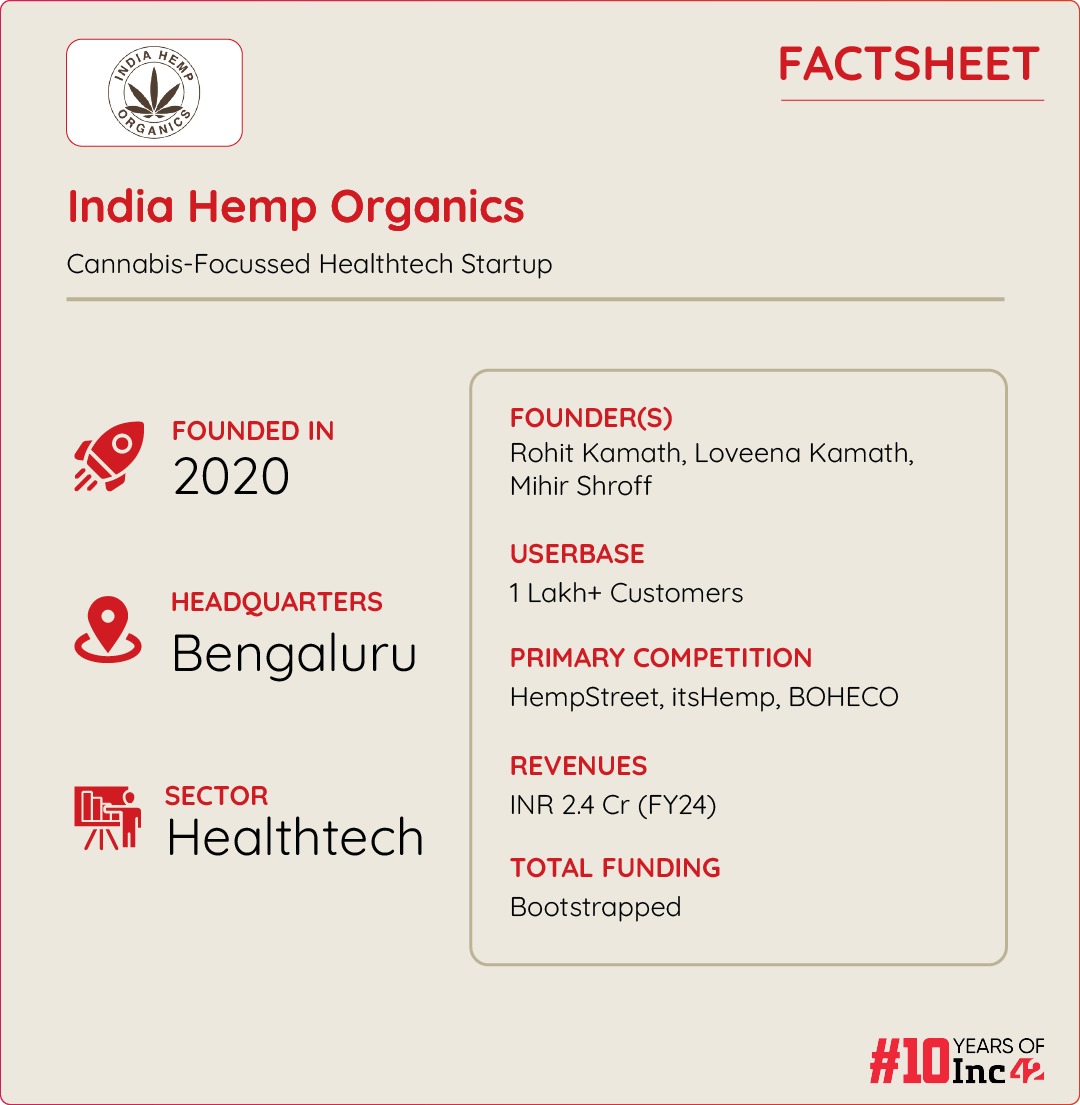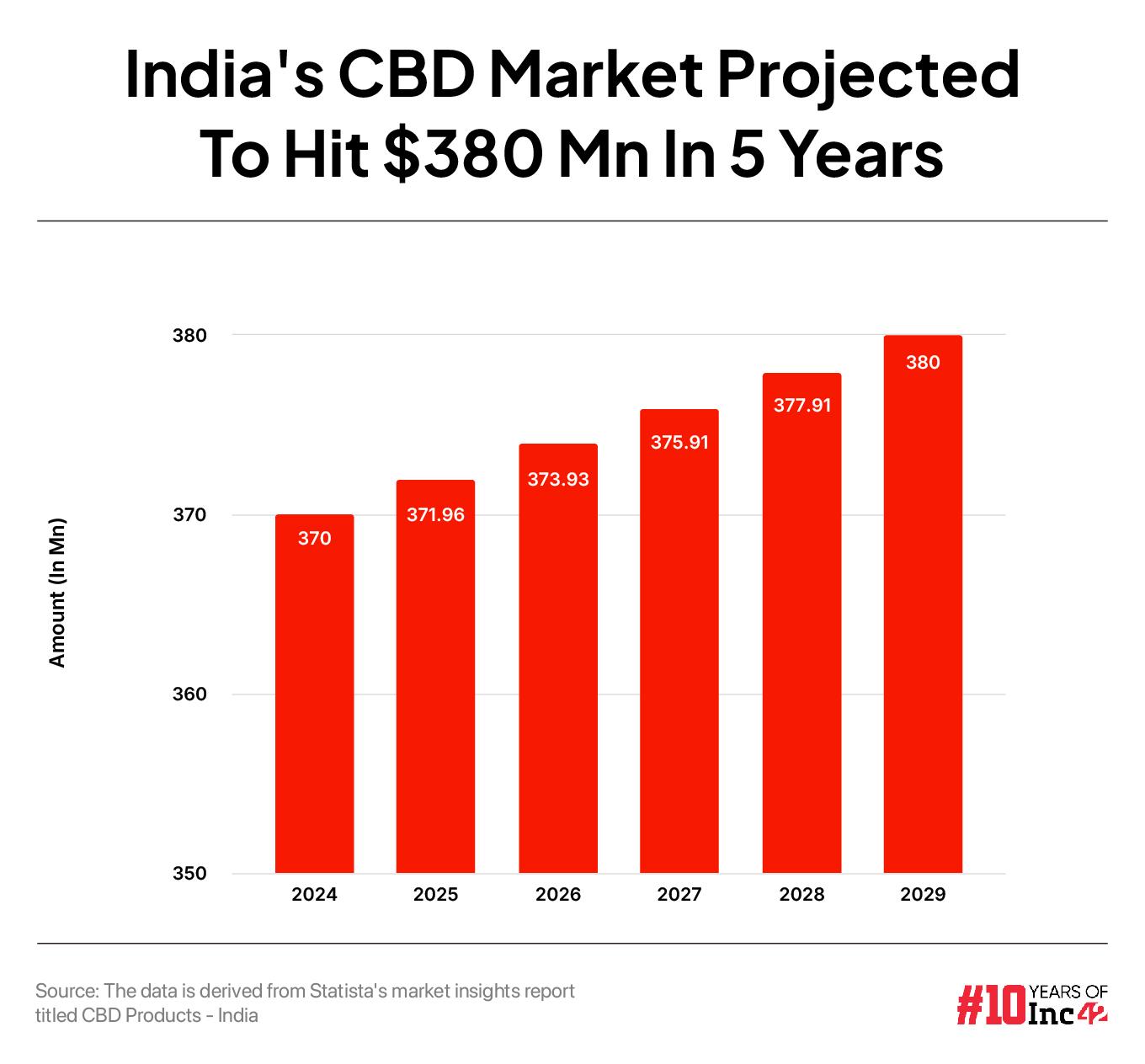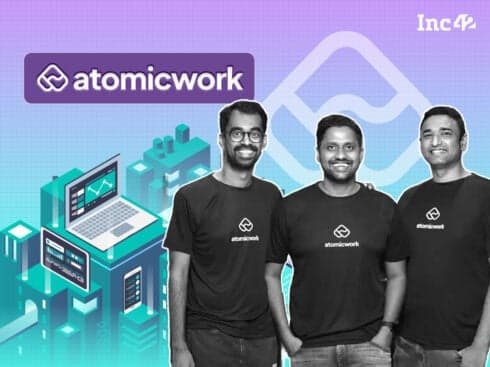The genesis of the startup stems from some of the most painful times that one of its founders had to endure after she met with a life-threatening accident resulting in multiple fractures in 2017
The startup offers medical cannabis, which can only be purchased with a prescription for stress, sleep, and pain. Its nutritional range includes hemp based protein powders, seed oil, protein bars, and others.
Per the founders, the startup garnered revenues to the tune of INR 2.4 Cr in FY24, while attaining profitability. In FY23, the startup’s revenues stood at INR 2.1 Cr versus a loss of INR 38.79 Lakh
After decades of stigma shrouding marijuana, also known as cannabis, medical science has now begun to recognise its benefits. In one of its reports, Harvard Health acknowledges the effectiveness of Cannabidiol (CBD), a major derivative of the cannabis plant, in the management of “epilepsy syndromes such as Dravet syndrome and Lennox-Gastaut syndrome (LGS) that typically don’t respond well to antiseizure medications”.
Interestingly, this is just one of the many studies that touts the use of medicinal marijuana in curing problems related to neurological conditions. Despite its magical properties, it is unfortunate that the plant is often seen by many as a gateway drug.
While that is a story for another day, Rohit and Loveena Kamath’s first tryst with the drug was purely medicinal and a means to avoid opioid-heavy prescriptions.
Speaking with Inc42, the founders of India Hemp Organics said that the genesis of the startup stems from some of the most painful times that Loveena had to endure after she met with a life-threatening accident that resulted in multiple fractures in 2017.
Not to mention, the treatment came with a toll of opioids-heavy prescriptions for pain relief. Although the drugs numbed the pain, they came with a host of side effects, including slowed breathing.
In search of alternatives, the couple resorted to extensive research on cannabis and along the way experimented with medical cannabis-based natural pain relief medication. The results were astonishing. The entire journey of the Kamaths’ tryst with destiny instilled in them the realisation that others like them could use their help.
As luck would have it, they crossed paths with cannabis wellness enthusiast Mihir Shroff, who played a key role in helping the duo float their cannabis-focussed healthtech startup, India Hemp Organics, in 2020.
The startup offers medical cannabis derived medication, which can only be purchased with a prescription for stress, sleep, and pain. Its nutritional range includes hemp based protein powders, seed oil, protein bars, and others. It sells its offerings via its website and ecommerce platforms Amazon and Flipkart.
According to Rohit, India Hemp Organics currently enjoys a customer base of about 1 Lakh individuals. It has a customer repeat rate of about 41%. He claims the company is on track to realise an annual revenue rate of $1 Mn by the end of the fiscal year.

India Hemp Organics’ Baby Steps
Before taking the entrepreneurial plunge, the Kamath duo, in their research, found that more than 20% of people in India suffer from chronic pain, sleep disorders, stress and anxiety-related medical conditions.
“On one hand, allopathic medicines provide quick results but often come with multiple side effects. On the other hand, Ayurveda offers a natural approach but lacks guaranteed effectiveness even in the long term. The concept behind India Hemp Organics was to find a middle ground — a medical range that is herbal in nature and delivers effective results without the side effects,” Kamath said.
To foray into the market, the founders, who don’t have a medical background, roped in a team of doctors and pharmacist to develop proprietary formulations for their intended products.
“Our team of researchers compounded CBD with other chemical extracts for specific ailments. After studying extracts and chemical compositions, we decided to supplement CBD with other herbs. For instance, for our sleep medication, we couple CBD oils with lavender oils, and for pain treatment, we use turmeric’s molecules,” he said.
Besides the extraction, a critical element in the cannabis puzzle remained the supply of the basic product. It is pertinent to note that the recreational use of cannabis and its various forms is legally prohibited in India.
However, the regulatory stance on the drug has been easing in recent years. In November 2021, the Food Safety and Standards Authority of India (FSSAI) legalised the sale of hemp seed, hemp seed oil, and hemp seed flour as food or as ingredients in food, provided they meet specific standards.
Besides, some Indian states have legalised commercial cultivation and consumption of specific cannabis-derived ingredients. Cannabidiol is derived from the Cannabis Sativa plant, which is legal in India.
In light of this, the founders procure hemp seeds from a network of 150-200 farmers from Uttarakhand. They also procure cannabis leaves for their medicinal products from excise departments of states of Madhya Pradesh, Uttar Pradesh, Punjab, and Rajasthan. Another critical challenge for the founders was the procurement of multiple licences for their operation. One of these included an excise licence to store and transport cannabis leaves.
Indian Hemp Organics’ Fundamentals
With all the parts of the manufacturing puzzle settled, the startup now had to find its users. Kamath said that while India has always been one of the biggest cannabis markets globally, there exists a huge gap when it comes to acceptance of the drug’s use.

He, however, added that users below the age of 35 are more open to understanding the use cases of CBD and hence trying out the product. For the older generation, the case is the opposite. To get more acceptance for hemp-based products, the startup focussed its marketing initiatives around educating people about the benefits of CBD through social media platforms.
“While the use of cannabis in India is still in its early stages, I believe that global developments will eventually influence the Indian market, especially given our rich cultural ties to the plant. For the industry to truly flourish, it is crucial to have support from the medical community and strong regulatory backing from the government,” Kamath opined.
While the future of the hemp industry remains uncertain and only time will tell how it unfolds, Kamath is confident that India Hemp Organics is positioned to play a key role in India’s cannabis journey.
The founder told Inc42 that the startup garnered revenue to the tune of INR 2.4 Cr in the fiscal year 2023-24 (FY24), while attaining profitability.
In FY23, the startup’s revenues stood at INR 2.1 Cr versus a loss of INR 38.79 Lakh. About 60% of the company’s revenue comes from its medical range and the rest from the nutritional range.
The cofounder claims that the startup’s monthly customer base is increasing at 8-10% month on month and currently stands at around 1 Lakh. Most of its user base hails from metro cities. Rohit said that the startup is currently bootstrapped and will continue to maintain its status quo.
India Hemp Organics compete with other startups like Boheco, Hemptyful, and HempStreet, among others. Notably, HempStreet picked up $1 Mn in investor funds in November last year.
Meanwhile, the line of medication has slowly gained more prominence in western countries. A report by Statista said that the CBD Products market in the United States hit $2.58 Bn and is poised to grow further. Kamath believes the increased global adoption will have a trickle down effect on India in the long run. As and when India’s CBD market broadens, the threat of more established global players stepping in is also prominent. For now, hemp majors like Charlotte’s Web, Colorado Botanicals, CBDfx, among others, have steered clear of the Indian market.
Pertinent to note that while the startup sees competition from the aforementioned entities in the CBD oil space, it take on other names like Cosmix Wellness, Myprotein India, India Hemp and Co in the hemp nutrition arena.
Yet, the VC community continues to be apprehensive of this of this space. To address this, bigger players need to join the fray, and for that to happen, government’s support is needed on several fronts, the Kamaths conclude.
[Edited by: Shishir Prashar]




 Fintech
Fintech Travel Tech
Travel Tech Electric Vehicle
Electric Vehicle Health Tech
Health Tech Edtech
Edtech IT
IT Logistics
Logistics Retail
Retail Ecommerce
Ecommerce Startup Ecosystem
Startup Ecosystem Enterprise Tech
Enterprise Tech Clean Tech
Clean Tech Consumer Internet
Consumer Internet Agritech
Agritech
































